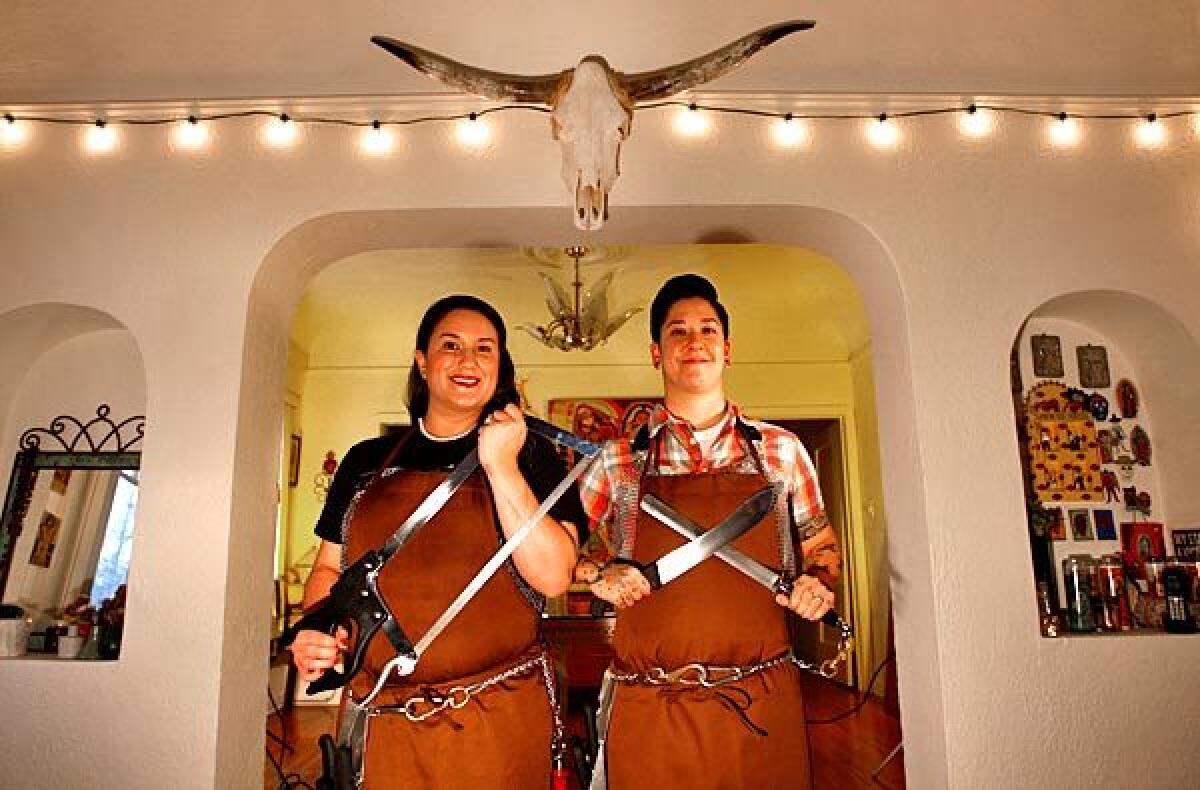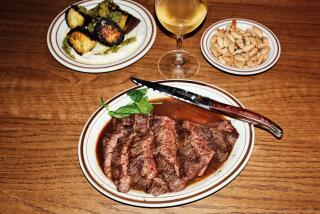Lindy & Grundy: Female butchers with a sustainable philosophy

To the connected diner, it may seem that Erika Nakamura and Amelia Posada arrived in Los Angeles ages ago. The larger-than-life personas behind Lindy & Grundy are practically household names among local foodies, though their butcher shop selling locally sourced, pasture-raised organic meat on Fairfax Avenue has yet to open. This tweeting team of cleaver-wielding butcherettes, as they call themselves, has been tapping into the city’s technologically engaged food culture, making the presence of their shop known well before it sells its first beef cheek.
Both barely clear the 5-foot mark, but they have quickly become social media giants. During their road trip from New York to California in August, the duo were already making a push to connect with their new demographic.
“I started following [on Twitter] every food industry person in Los Angeles and California that I felt was a part of something that I wanted to be a part of,” Posada says. “I was trying to understand the food scene out here, figuring out what people are into and not into. Everyone who we’ve done business with, I know who they are before I [physically] meet them.”
Through their interactivity, Posada and Nakamura also inadvertently tapped into an underground network of female butchers. Women in the industry from Kentucky to Toronto started reaching out, offering advice on such topics as finding beef purveyors and making it as a woman in the business.
The sense of support has been welcome in the male-dominated industry.
“I do think that no matter how good we are or how long we’ve been doing it, we are two 5-feet-tall women.… People will always look to the big dude in the back,” says Nakamura of their experience apprenticing at Fleisher’s, a butcher shop with similarly sustainable sentiments in New York.
But being female can also work for the team, whose Fairfax district storefront is set to open in early February.
Shawna Dawson, organizer of the Artisanal LA festivals that celebrate the city’s sustainable handmade goods — was immediately drawn to Lindy & Grundy’s online presence and asked them to do meat fabrication demonstrations at her October event.
“I don’t think it’s shocking that people would be intimidated by someone who’s wielding a knife and splattered in blood,” Dawson says. “But they have an approachable female face … it’s more accessible. Many of the butchers around are not people the younger generation would look at as peers. I think they’re filling a much-needed niche.”
That sense of approachability is exactly what the women hope their business will deliver. Once they get into the groove after a few months, they aim to teach courses on cooking the whole animal and lessons on butchering, with small class sizes to ensure that everyone has a personalized, hands-on experience.
“We’re also going to do webisodes and do instructional tips on our website,” Posada says. “We want to reach people who may not be used to eating [different cuts of] meat.”
They also hope to tap into a group of vegetarians who might not have had access to sustainably produced meat before and want to delve back into the omnivorous world. So in addition to their kimchi pork and lamb pastrami links, Lindy & Grundy will be grinding a “gateway sausage,” a sweet Italian variety that will have a mixture of chicken and tofu.
Though this may stir some controversy in the vegetarian community, Posada and Nakamura believe they are championing a similar fight against commercial farming. Both abstained from eating meat for a good portion of their lives, in fact — Posada for 14 years, and Nakamura for seven.
Posada grew up in Pasadena, and Nakamura is from Tokyo. The two met in Brooklyn at a drag show where Posada was bartending. Even then, their social-media savvy helped define their relationship. During their courtship, Nakamura would send long, well-written MySpace messages, which piqued Posada’s interest.
Nakamura is a classically trained chef who trailed — was an observer in restaurant kitchens — at high-end New York establishments, such as Dan Barber’s renowned Blue Hill at Stone Barns. The heat of commercial kitchens wasn’t for her, but one thing that always clicked was being assigned to the butcher block.
The idea of opening their own storefront on the West Coast came when the couple paid a visit to Posada’s family in L.A. in 2009. When they were unable to find a shop in the area selling 100% locally produced, sustainable meat, a light bulb went off: The women would open a butcher shop.
Nakamura, 30, and Posada, 28, apprenticed with Joshua and Jessica Applestone at Fleisher’s meats in Kingston, N.Y., for eight months before moving west in August. Their mentors at Fleisher’s share their philosophy of sustainability, while maintaining an approachable, old-school butcher shop aesthetic. The young women hope to eventually host apprenticeships the way the Fleishers do, but that will come later, after the shop is established.
“We were trained by Josh and Jessica to make sustainable butchering a bigger thing,” Nakamura says. “We can tackle the country from opposite ends. Teaching is the No. 1 way to get things across.... That’s the best way to be an activist.”
After getting hitched in Connecticut in early August, Posada and Nakamura — nicknamed Lindy and Grundy, respectively — headed out to Los Angeles, making a pit stop in Santa Barbara to celebrate with a “nose-to-tail” themed wedding party, where the tables were marked by beef cuts instead of numbers. (Their single friends from New York were placed at the “strip steak” table, of course.)
Their West Hollywood storefront won’t sell any meat unless they have been allowed to tour the farm where the animal was raised and the slaughterhouse where it was killed. They will be sourcing their beef from a few select California ranches, including Santa Barbara County’s Rancho San Julian, for which they helped to line up a mobile slaughter unit.
“We are big proponents of it because that way the animals don’t have to travel to slaughter,” Posada says. “There’s much less stress.”
The Applestones are consulting on the Lindy & Grundy venture, helping them with such tasks as finding a branding manager and scouting slaughterhouses. The store is being financed mostly through family investors and personal loans.
“On the most basic level, what they are doing is something that people are really looking for, especially these days,” Jessica Applestone says. “The fact that they are smart, sassy and chicks with knives doesn’t hurt.”
Their storefront will take cues from Fleisher’s old New York vibe, but the design will have a distinct sense of their ‘50s-inspired personal style. Posada, who studied journalism and has a professional background in interior design, will be crafting custom window displays. Other design elements include walls covered in subway tiles and floor-to-ceiling chicken-wire glass windows lining the corridor from the retail space to the walk-in cooler, which will allow customers to view the women breaking down animals.
The shop is a family effort. Posada’s cousin Gabrielle Shelton is designing the meat rail that will guide the carcasses on hooks attached to tracks on the ceiling back to the walk-in, as well as cleaver-shaped sconces that will line the walls. The refrigerator will be installed by Posada’s grandfather.
They’ll also have a commercial smoker, where they’ll do their house-cured bacon, pastrami and pork chops.
Aside from the obligatory glass meat cases, the retail area at Lindy & Grundy will showcase the butchers in their chain-mail aprons, breaking down animals at their butcher block. They’ll sell a variety of prepared foods, including dishes made from family recipes: tamales, pot pies, stocks and chili. They also plan on carrying 25 to 30 California-produced cheeses, for which they’re taking votes on Twitter.
“This is a new food movement,” Nakamura says. “It feels like we’re making a contribution, and that’s really awesome.”
Here are some other locations where you can purchase meat from sustainably raised animals:
Lindner Bison
This family-owned Valencia ranch raises grass-fed bison. They practice sustainable agriculture and humane animal husbandry. Lindner has a stall at the Santa Monica farmers market.
Lindner Bison; [email protected]; (661) 254-0200; https://www.lindnerbison.com.
Kendor Farm
Kendor Farm, located in the San Fernando Valley, sells free-range, organic chickens and eggs. They are available at the Calabasas, Encino, Hollywood and Peninsula Center farmers markets.
Kendor Farm; 17344 Vanowen St., Lake Balboa; (818) 774-0755; https://www.kendorfarms.com.
McCall’s Meat & Fish
McCall’s sells pork and beef from sustainably raised animals and sources Berkshire pigs from Reride Ranch in Lake Hughes. ( It sells meat from nonsustainably raised animals as well.)
McCall’s Meat & Fish, 2117 Hillhurst Ave., Los Feliz; (323) 667-0674; https://www.mccallsmeatandfish.com.
Salt’s Cure
Salt’s Cure has all California-raised meats on the menu. Chef-owners Chris Phelps and Zak Walters visit the farms to ensure fair treatment of animals and plan to have the butcher-case portion of their store running within six months.
Salt’s Cure, 7494 Santa Monica Blvd., West Hollywood; (323) 850-7258; https://www.saltscure.com.
Rocky Canyon Farm
Rocky Canyon travels to the Hollywood farmers market from Atascadero, Calif., to sell its pasture-range, grass-fed cattle and pigs.
Hollywood farmers market, at Selma and Ivar, Hollywood; 8 a.m. to 1 p.m. Sunday.
More to Read
Eat your way across L.A.
Get our weekly Tasting Notes newsletter for reviews, news and more.
You may occasionally receive promotional content from the Los Angeles Times.










